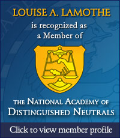A few words can make a big difference in California arbitration discovery
By Hon. Gary Nadler (Ret.) and Hon. Louise LaMothe (Ret.) Arbitration is a much more economical and expedient way to resolve issues than litigation. As for discovery in arbitration, there can be anything from no prehearing discovery to the full range of discovery options. It all depends upon the arbitration agreement between the parties. […]






